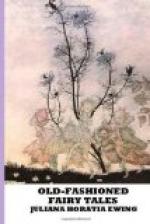He found his way to the Rath all correct, and sure enough the fairies were dancing, and they asked him to join. He danced the soles off his brogues, as Pat did, and the fairy man lent him his shoes, and sent him home in a twinkling.
As he was going over the ditch, he looked round, and saw the roots of the furze-bushes glowing with precious stones as if they had been glow-worms.
“Will you help yourself, or take what’s given ye?” said the fairy man.
“I’ll help myself, if you please,” said the cobbler, for he thought—“If I can’t get more than Pat brought home, my fingers must all be thumbs.”
So he drove his hand into the bushes, and if he didn’t get plenty, it wasn’t for want of grasping.
When he got up in the morning, he went straight to the jewels. But not a stone of the lot was more precious than roadside pebbles. “I ought not to look till I come from the Rath,” said he. “It’s best to do like Pat all through.”
But he made up his mind not to return the fairy man’s shoes.
“Who knows the virtue that’s in them?” he said. So he made a small pair of red leather shoes, as like them as could be, and he blacked the others upon his feet, that the fairies might not know them, and at sunrise he went to the Rath.
The fairy man was looking over the ditch as before.
“Good-morning to you,” said he.
“The top of the morning to you, sir,” said the cobbler; “here’s your shoes.” And he handed him the pair that he had made, with a face as grave as a judge.
The fairy man looked at them, but he said nothing, though he did not put them on.
“Have you looked at the things you got last night?” says he.
“I’ll not deceive you, sir,” says the cobbler. “I came off as soon as I was up. Sorra peep I took at them.”
“Be sure to look when you get back,” says the fairy man. And just as the cobbler was getting over the ditch to go home, he says:
“If my eyes don’t deceive me,” says he, “there’s the least taste in life of dirt on your left shoe. Let me dust it with the tail of my coat.”
“That means home in a twinkling,” thought the cobbler, and he held up his foot.
The fairy man dusted it, and muttered something the cobbler did not hear. Then, “Sure,” says he, “it’s the dirty pastures that you’ve come through, for the other shoe’s as bad.”
So the cobbler held up his right foot, and the fairy man rubbed that with the tail of his green coat.
When all was done the cobbler’s feet seemed to tingle, and then to itch, and then to smart, and then to burn. And at last he began to dance, and he danced all round the Rath (the fairy man laughing and holding his sides), and then round and round again. And he danced till he cried out with weariness, and tried to shake the shoes off. But they stuck fast, and the fairies drove him over, the ditch, and through the prickly furze-bushes, and he danced away. Where he danced to, I cannot tell you. Whether he ever got rid of the fairy shoes, I do not know. The jewels never were more than wayside pebbles, and they were swept out when his cabin was cleaned, which was not too soon, you may be sure.




